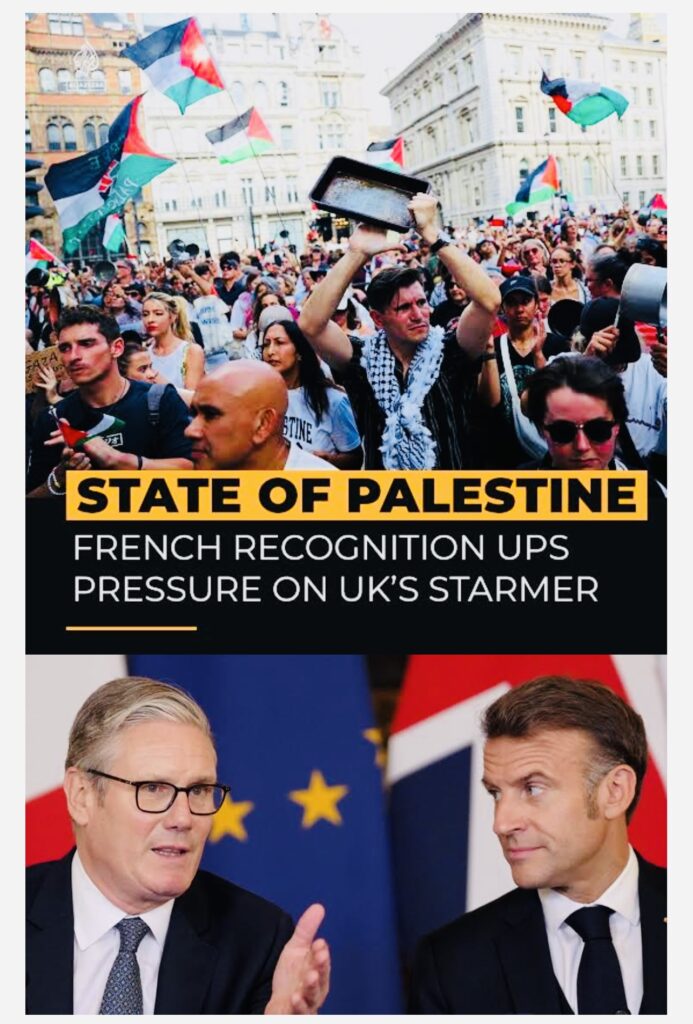
The writer is an economist, an anchor, geopolitical analyst
and the President of the All Pakistan Private Schools’ Federation
president@Pakistanprivateschools.com
The Israeli-Palestinian conflict has escalated, with significant violence in Gaza leading to over 90,000 Palestinian deaths and a humanitarian crisis involving starvation and displacement. This has prompted international responses, including potential state recognitions by major powers like France and the UK. It seems likely that France and the UK will recognise Palestine as an independent state in September 2025, driven by Israel’s military actions in Gaza, as aggression and genocide. France, led by President Emmanuel Macron, has announced it will recognise Palestine unconditionally at the UN General Assembly in September 2025. Macron stated, “In keeping with its historic commitment to a just and lasting peace in the Middle East, I have decided that France will recognise the State of Palestine. I will solemnly announce this at the United Nations General Assembly in September this year.” This announcement was made in the context of a planned summit co-hosted with Saudi Arabia around the UN General Assembly, aimed at building momentum for a two-state solution. France’s recognition appears unconditional, announced by President Macron, while the UK’s recognition is conditional on Israel taking steps like a ceasefire and no West Bank annexation. On July 29, 2025, Starmer stated this would happen unless Israel agrees to a ceasefire with Hamas, allows more aid into Gaza, commits to no West Bank annexation, and supports a long-term peace process for a two-state solution. This reflects domestic and international pressure, with 221 MPs urging action. The UK’s position builds on a 2014 House of Commons vote favouring recognition, though non-binding, and aligns with recent calls from Palestinian Ambassador Husam Zomlot to act before the UN conference. Israel, led by Netanyahu, opposes the recognitions, calling them a “reward for terror.” Hamas welcomes France’s move, seeing it as progress toward statehood. Other countries like Spain, Ireland and Norway have already recognised Palestine, potentially encouraging more recognitions. This could isolate Israel diplomatically, but may not resolve core issues like borders and settlements. The ongoing Israeli-Palestinian conflict has been a longstanding issue, with various countries taking different stances on the matter. Recently, there have been developments suggesting that France and the UK will officially recognise Palestine as an independent state. This potential shift in policy comes amid growing concerns over Israeli aggression and genocide against Palestinians. The Israeli-Palestinian conflict has its roots in the early 20th century, with both sides claiming rights to the same land. Despite numerous peace talks and international efforts, a lasting resolution remains elusive. The situation has been further complicated by Israeli settlements in the West Bank and Gaza Strip, which are considered illegal under international law. France has historically been a strong supporter of Palestinian rights. In 2014, the French Parliament voted in favour of recognizing Palestine as a sovereign state. While this was a significant step, it was not a formal recognition by the French government. However, with the recent escalation of violence and humanitarian crises in Gaza and the West Bank, France might be reconsidering its position. Whereas the UK’s stance on Palestine has been more nuanced. While the UK government has consistently called for a two-state solution, it has stopped short of formally recognising Palestine as an independent state. However, in recent years, there has been growing pressure from within the UK to take a more decisive stance on the issue. If France and the UK were to officially recognise Palestine as an independent state, it would be a significant development in the international community’s approach to the conflict. Such recognition would likely have several positive impacts: Formal recognition by two major European powers could increase international pressure on Israel to negotiate a peaceful resolution to the conflict; Recognition would lend credence to Palestine’s claims of statehood, potentially paving the way for greater international support and participation in global forums; While recognition alone might not resolve the conflict, it could create a framework for more meaningful negotiations between Israel and Palestine. However, there are also potential challenges and considerations: Israel might view such recognition as a provocation, potentially leading to further escalation in the conflict; The recognition of Palestine by France and the UK could have broader implications for international relations, particularly in the Middle East; While recognition is an important step, the path to lasting peace would still require significant diplomatic efforts and compromise from both sides. The potential recognition of Palestine by France and the UK would mark a significant shift in the international community’s approach to the Israeli-Palestinian conflict. While it would not solve the conflict overnight, it could be a crucial step towards a more comprehensive and lasting resolution. The Israeli-Palestinian conflict, marked by decades of tension, reached a critical juncture in 2025, with significant escalations in Gaza prompting international responses. This decision, framed by the user as a response to “Israel’s aggression and genocide of Palestinians,” reflects growing global concern over the humanitarian crisis in Gaza, where over 90,000 Palestinian deaths have been reported, alongside widespread starvation and displacement. The decision is rooted in the ongoing humanitarian crisis in Gaza, where Israeli military operations have led to significant civilian casualties and destruction. Reports from Al Jazeera and DW highlight at least 38 people killed by Israeli attacks in early July 2025, with starvation affecting 2 million residents amid aid restrictions. France’s move positions it as the first G7 nation to recognise Palestine, following smaller European countries like Spain, Ireland, and Norway, which formalised recognition in 2024.
While recognition is a diplomatic victory for Palestinians, its practical impact remains uncertain, with Israel’s opposition and unresolved core issues posing challenges. As the world watches, these developments could either pave the way for renewed peace efforts or further complicate the already fraught relations in the region.
Israel’s ongoing conflicts with Iran, Syria, Hamas, and Lebanon have led to a series of diplomatic setbacks. The Israeli-Palestinian conflict is deeply intertwined with regional dynamics, particularly the relationships between Israel, Iran, and Arab states. Iran’s support for Hamas and Hezbollah has been a significant factor in the conflict, and Israel’s actions in Gaza and Lebanon have raised concerns about the potential for wider regional escalation. The recent Palestinian genocide by Israel and the escalation of violence in Gaza and the West Bank have drawn widespread international condemnation, with many countries calling for an immediate ceasefire and a two-state solution. Israel’s actions have been criticised for being disproportionate, and its refusal to engage in meaningful negotiations has hindered progress towards a peaceful resolution. France’s recognition is unconditional, signalling a clear stance that Palestinian statehood is a moral and political imperative, regardless of Israel’s actions. This aligns with Macron’s history of bold diplomatic gestures and France’s role in shepherding allies toward recognition. The motivation appears driven by the failure of previous peace initiatives and the urgent need to address the imbalance of power, with the ICJ ruling in July 2024 declaring Israel’s occupation illegal. Reactions include Hamas welcoming the move, calling on other countries to follow, while the Saudi Ministry described it as a “historic decision.” Whereas the UK’s conditional approach reflects a cautious stance, balancing support for Israel’s security with addressing Palestinian suffering, Starmer’s government has faced intense political pressure, with cabinet ministers like Angela Rayner and Yvette Cooper backing recognition. The conditions aim to leverage recognition as a tool to pressure Israel, but they also highlight the complexity of the issue, with the UK requiring substantive steps like a ceasefire with Hamas. Hamas, the Palestinian Authority welcomed France’s announcement, describing it as a “positive step” and urging other countries to follow. Hamas sees recognition as validation of Palestinian rights and a step toward ending Israeli occupation. Spain, Ireland, and Norway have already recognised Palestine, with over 140 UN member states doing so. France’s move, as a major Western power, is expected to encourage further recognitions, potentially isolating Israel diplomatically. The UK’s conditional stance has drawn global attention. Under President Donald Trump, the U.S. has not signalled support, with Trump dismissing Macron’s announcement as “not going to change anything”. The U.S. remains Israel’s closest ally, contrasting with the European shift. France’s unconditional recognition and the UK’s conditional stance highlight a European push for Palestinian statehood, potentially encouraging more nations to act. This could lead to increased diplomatic isolation for Israel, especially if the UK proceeds in September. While recognition is symbolic, it could catalyse renewed negotiations. However, Israel’s government, under Netanyahu, has shown little willingness to compromise, and unilateral recognitions may harden its stance. The UK’s conditions, such as a ceasefire and no annexation, could serve as a framework, but their fulfilment is uncertain. The announcements come amid accusations of genocide, with South Africa filing an ICJ case and the court ordering Israel to prevent genocide in Gaza. Recognition could strengthen legal and moral arguments for Palestinian self-determination, aligning with UN General Assembly demands in September 2024 to end occupation within 12 months. Although recognition does not grant Palestine full UN membership, requiring a Security Council vote likely vetoed by the U.S. it also does not resolve core issues like borders, settlements, or Jerusalem, and Israel’s opposition may limit practical impact. But internationally, these recognitions could tip the balance, with over three-quarters of UN member states already recognising Palestine. These moves come at a critical juncture, with Gaza facing a genocide of Palestinians by Israel, and humanitarian catastrophe, and peace negotiations stalled. The potential shift in policy towards Palestine by France and the UK marks a significant development in the Israeli-Palestinian conflict. While recognition of Palestine by these countries would not solve the conflict overnight, it could be a crucial step towards a more comprehensive and lasting resolution. Israel’s diplomatic failures, meanwhile, highlight the need for a more nuanced and effective approach to conflict resolution. While recognition is a diplomatic victory for Palestinians, its practical impact remains uncertain, with Israel’s opposition and unresolved core issues posing challenges. As the world watches, these developments could either pave the way for renewed peace efforts or further complicate the already fraught relations in the region.

